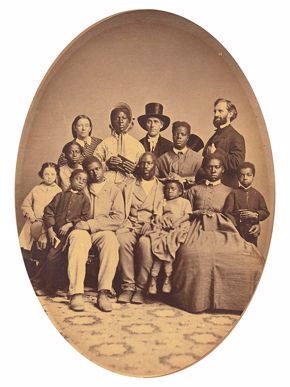Recognizing a Day of Jubilee: “Juneteenth Independence Day” June 18, 2020

James Presley Ball, Levi Coffin and Underground Railroad Passengers, 1860–68, albumen silver print from glass negative, the Museum of Fine Arts, Houston, Museum purchase funded by the Buddy Taub Foundation, Dennis A. Roach and Jill Roach, Directors.
On Juneteenth, we recognize the historic day of June 19, 1865, when the last of the nation’s enslaved African Americans—in Galveston, Texas—learned of their freedom, more than two years after President Abraham Lincoln issued the Emancipation Proclamation.
Texas was the first state to establish Juneteenth as a holiday, in 1980, even though it has been celebrated informally since 1865. President Lincoln had signed the Emancipation Proclamation freeing slaves in January 1863, but it took two years for word to reach Galveston.
The holiday serves as an opportunity to commemorate the abolition of slavery, listen to Black voices, highlight the continued struggle for social justice, and acknowledge that Black lives matter.
From the MFAH Photography Collection
Levi Coffin and Underground Railroad Passengers
This exceedingly rare photograph, in which the figures’ expressions and body language carry a powerful egalitarian message and emotional charge, is the work of J. P. Ball, one of the most prominent 19th-century African American photographers. Over the course of three decades—first in Newport, Indiana, and later in Cincinnati, Ohio—Levi and Catharine Coffin sheltered and helped ferry to freedom an estimated 3,300 escaped slaves. Dubbed “President of the Underground Railroad” by frustrated slave hunters, Coffin (back center) found his Quaker beliefs incompatible with the idea of slavery and devoted his life to the cause of abolition and education of the emancipated.
The Museum is deeply grateful to MFAH Photography Subcommittee member Dennis Roach, whose generous funding, through the Buddy Taub Foundation, made the acquisition of Levi Coffin and Underground Railroad Passengers possible. Moved by the picture and the story behind it, Roach pledged funding and asked that the photograph not disappear into the storage vault, but instead be exhibited, reproduced, used for teaching, and built around. African American life and experience is a subject that has long been a part of the MFAH photography collection, but almost exclusively centered in the 20th century, and particularly on the Civil Rights movement and more recent times. In response to Dennis Roach’s challenge, the Museum has already made additional purchases of photographs related to slavery, abolition, and the role of African Americans in the Civil War, and further important acquisitions are in the works.





